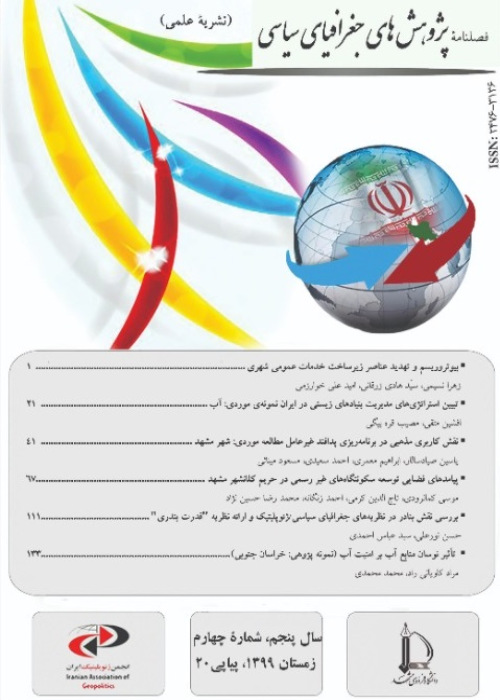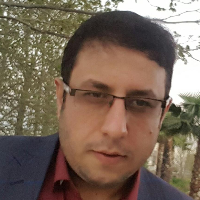Escalation of Confrontation the United States and Islamic Republic of Iran in West Asian Post unrest; Consequences of the Assassination of Major General Qassem Soleimani
In principle, the nature of foreign policy of the United States, especially among Republicans, is based on issues such as strong support for Israel, emphasis on fighting with enemies, unwillingness to compromise with political and military rivals, and the maximum interest of the United States in the shadow of intimidation and threats. This has posed a serious challenge in the West Asian region, especially with the growing strength of the Islamic Revolutionary Guard Corps (IRGC) in the post-ISIS era and the formation of a powerful Shiite coalition. In this article, the authors attempt to provide an answer to this question: What was the cause of the assassination of Major General Ghassem Soleimani, the commander of the Quds Force of the Islamic Revolutionary Guard Corps by Trump? And then what are the possible implications for the future of the region's security? The paper's hypothesis, based on Haug Miall's cyclic model theory, implies that the historical backdrop of the crisis goes back to the time of concluding the Joint Comprehensive Plan of Action, in addition to the historical hostilities after the Islamic Revolution. The stage of this crisis is related to the growing formation of the Shiite resistance front during the rise of ISIS and Post- ISIS and the imposition of heavy US economic sanctions on the IRGC in the region. In the confrontation phase, the direct and indirect military challenges and threats of the two countries against each other such as placing the Revolutionary Guards on the list of international terrorist groups can be mentioned. And finally, in the mediation phase, we can mention Japan's mediation activities.The paper's findings also indicate that the failure of Trump's policies at all stages, his impeachment of Democrats within the US political system, and ultimately the need for a major breakthrough to succeed in the upcoming election make him eventually to assassinat Major General Soleimani, the commander of the Quds Force of the Islamic Revolutionary Guard Corps.
The "Conflict Cycle Model" was proposed by Miall Haug, in which several steps are considered for a crisis. This step is as follows:
Crisis potential stage;
Crisis Development Stage;
Mediation and mediation of international and regional organizations and powers;
Stage of collision and confrontation.
The research method of this article is historical sociology.
In the crisis potential stage: Trump believes that the jcpoa agreement has brought down the hegemony of the United States and has increased the power of Iran and the Revolutionary Guards. So he canceled the deal at this point;In Crisis Development Stage: Trump stressed the expansion of the Shiite sphere of influence in the Middle East and the threat of Shiites to Israel (which is a strategic ally of the United States in the Middle East) to create a crisis with the Revolutionary Guards;In Mediation and mediation of international and regional organizations and powers: In this Stage, Trump sent Japanese Prime Minister Shinzo Abe to Tehran to mediate between him and Islamic Republic officials So that he can create the conditions for a new agreement.In Stage of collision and confrontation: At this stage, Trump first placed the Islamic Revolutionary Guard Corps under terrorist groups. Then, He imposed economic sanctions on this group and eventually, he threatened war and direct confrontation (sending warships to the Persian Gulf). Trump's failure to persuade the Islamic Republic to sign a new treaty and the need for a major breakthrough to succeed in the upcoming election, He eventually assassinated Major General Soleimani, the commander of the Quds Force of the Islamic Revolutionary Guard Corps.
The Islamic Republic of Iran has repeatedly challenged US hegemony in the Middle East and has sought to limit US influence. In fact, Iran has always defined the US presence in the region as a security challenge, not as a precursor to a regional security system. After the rise of ISIS, the Islamic Republic of Iran, especially the Quds Force of the Islamic Revolutionary Guard Corps, supported its strategic allies, Syria and Iraq. The support that continued to lay the groundwork for a deep Shiite coalition led to the relative decline of ISIS. This should be considered a great achievement for Iran, along with the formation of the Popular Mobilization Forces military in Iraq and Hezbollah in Syria, because the nature of these military groups is the same as the opposition to US policies. For this reason, the United States, after the fall of ISIS, considered Iraq and Syria as a kind of loser, and its main analysis was based on the extensive influence of the Islamic Revolutionary Guard Corps in these countries and some other Middle Eastern countries such as Yemen and Afghanistan. As a result, Trump, while placing the Islamic Revolutionary Guard Corps under international terrorist groups, eventually assassinated Major General Soleimani and Abu Mahdi al-Mohandes so that he would not see his interests lost in these countries any more. Trump's terrorist act could pose a major security, economic and military challenge to the United States and its allies in the Middle East. An action that will face strong Shiites reactions in the not-too-distant future.
- حق عضویت دریافتی صرف حمایت از نشریات عضو و نگهداری، تکمیل و توسعه مگیران میشود.
- پرداخت حق اشتراک و دانلود مقالات اجازه بازنشر آن در سایر رسانههای چاپی و دیجیتال را به کاربر نمیدهد.



